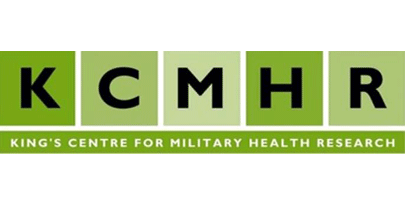Launch of report 'The Helping Armed Forces Loved Ones Study'
Armed Forces personnel are not immune to experiencing mental ill-health, and whilst more are accessing mental healthcare services in the last decade, a substantial proportion of Armed Forces personnel with mental health problems do not seek any formal mental health support.
Help for Heroes and the King’s Centre for Military Health Research (KCMHR) recognised the potential that family members, including spouses, parents and close friends could have in recognising the signs of a mental health concern and encouraging help seeking in service and ex-service personnel. However, most family members are not aware of the best way to help support such treatment seeking for their loved one.
Community Reinforcement Approach and Family Training (CRAFT) is an approach developed in the US for those whose loved one is ‘treatment resistant’, that is, someone who is reluctant to reach out for support services. CRAFT aims to provide family members with information and support about how to encourage a loved one to seek help as well as providing the family member themselves with support for their own wellbeing.
Although originally developed to support those experiencing difficulties with alcohol and substance misuse CRAFT has recently been adapted to support US military veterans with Post-Traumatic Stress Disorder (PTSD).
The recently completed HALO report outlines a collaboration between KCMHR and Help for Heroes who also commissioned this research, centred on adapting CRAFT for use with UK service and ex-service personnel experiencing PTSD, alcohol misuse problems and also other common mental disorders such as anxiety and depression: UKV-CRAFT.
UKV-CRAFT was developed as a guided self-help workbook (available at: www.kcmhr.org/HALO/UKV-CRAFTmanual.pdf) to be supported by individual sessions with a CRAFT-trained Psychological Wellbeing Practitioner working within the Hidden Wounds service; an aspect of the Help for Heroes Psychological Wellbeing Service.
UKV-CRAFT consists of 8-12 weekly sessions which are delivered in person or over Skype/telephone and include 11 short lessons:
- What are Common Mental Disorders, PTSD, and Alcohol Use Disorders?
- Safety planning,
- Increasing positive behaviours,
- Improving your communication skills,
- Improving problem solving,
- Responding to problem behaviours,
- Goal setting,
- Self-care,
- Understanding professional help and treatment options,
- How to help your veteran/ service person consider professional help, and
- Supporting your veteran/ service person’s recovery.
As well outlining the development of UKV-CRAFT the report summarises the results of a feasibility trial to understand how effective UKV-CRAFT might be at encouraging Armed Forces loved ones to seek professional help and what effects UKV-CRAFT might have on the mental health and wellbeing of the family members of Armed Forces loved ones.
The feasibility trial, although conducted on low numbers, indicated that UKV-CRAFT could encourage help seeking behaviour in Armed Forces loved ones and could positively impact the mental health and wellbeing of their family members.
A series of interviews with both those who received UKV-CRAFT and key stakeholders working in the Armed Forces personnel health and wellbeing sphere (i.e. range of professionals providing services to Armed Forces families) suggested that Armed Forces families had been somehow overlooked by both the Ministry of Defence (MoD), and the charity sector. UKV-CRAFT was seen as having the potential to go some way towards addressing this gap with its recognition of family members as individuals in their own right as well as in their role in supporting a loved one.
Whilst CRAFT was originally developed specifically for those who are treatment resistant, the report suggests that there is wide-spread support for broadening the scope of UKV-CRAFT, opening it up to those whose loved ones had tried to access support and been frustrated with repeated experiences of attempting to access treatment.
Indeed, the report goes further and suggests the potential to offer UKV-CRAFT to all Armed Forces family members, of both serving personnel and veterans. If such a programme were provided in anticipation of times of likely need, specifically pre-deployment or before return from deployment and around time of transition out of the Armed Forces, this may help service personnel seek help at an earlier stage when their difficulties were less intractable as well as bolstering mental resilience among concerned significant others.
Head of Psychological Wellbeing at Help for Heroes, Sarah Jones, says:
“At Help for Heroes we have long recognised the vital role family members play in a veteran’s recovery. We also acknowledge the importance of encouraging veterans to get help when they need it, and the positive impact of supporting a whole family’s wellbeing during this time. We are proud to be involved in the CRAFT study alongside King’s Centre for Mental Health Research, delivering interventions for the study and are already working on new ways to implement these findings as part of the Help for Heroes Hidden Wounds service for veterans and family members.”
The full report can be found here.
Header photo by taylor hernandez on Unsplash
